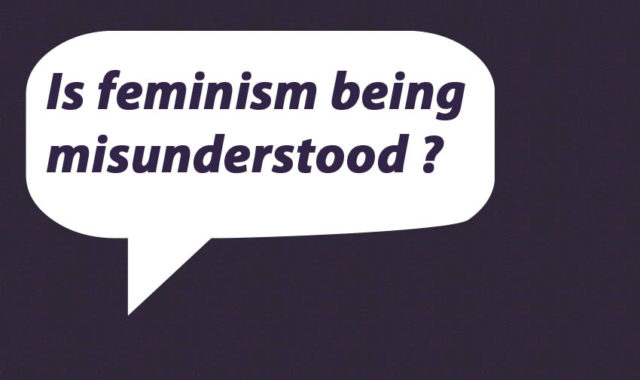Let’s begin with how Oxford English Dictionary and more defined feminism when it was coined initially.

1895 witnessed the definition of the term ‘feminism’ in Oxford English Dictionary as, “advocacy of the rights of women (based on the theory of equality of the sexes).”
Also, as the waves of feminism passed in the nineteenth and twentieth century, Merriam-Webster Dictionary took to defining the subject as “the theory of political, economic, and social equality of the sexes”, which the present day American society quite associates with.
To begin with, nothing in the above mentioned definitions of the term reflects the meaning as something as grave as an anti-men or anti-political movement. The word feminism originated from the French word ‘fe`minisme’ and it was coined by the French Philosopher, Charles Fourie, in view of improving the status of women. Further the idea of feminism spread to Netherlands, Great Britain and United States in 1872, 1890s, and 1910 respectively. Even though feminists around the world had different motives back then, depending on their culture and historical aspects, what really matters is that the feminist movements revolved around somewhat similar issues with three waves dividing them – the first wave, a period from the nineteenth to early twentieth century, that comprised of Women’s suffrage movements, promoting women’s political rights; the second wave, a period in the mid-twentieth century, that was associated with women’s liberation movement and campaigns for legal and social equality for women; and the third wave, a period from the late twentieth century to the present day, that is probably the reaction to failures of second-wave feminism. The first seeds of feminism were sowed in mid-1800s during the anti-slavery and temperance movements when Elizabeth Cady Stanton and Lucretia Mott were denied seats at a Convention in London just because of their gender. The suffrage movement gathered momentum after Stanton penned down the Declaration of Sentiments which presented the need for equality among men and women, including voting rights.
On the other hand, talking about feminism in India, the historical movements reflect a clear tide of culture-specific issues that existed in India’s patriarchal society then. Infact, India’s feminist movements were initiated by men when majority of women’s issues were brought in the fore for reforms to be made. Prominent figures arose amidst extreme adversities – Kamini Roy, a poet by nature, became the first woman to hold Graduation in Honors in India in 1886; then there was Maharani Jind Kaur who was well known for her dynamic personality. She is still one of the marked feminists who instilled fear, with her rebellious approach, among the British during colonial rule in India. Basically feminism in India had three phases with them being – Movements against Sati; Mahatma Gandhi’s incorporation of women’s movements into the Quit India Movement that led to establishment of more independent women’s organizations; and the post-colonial rule that focused on fair treatment of women at home, work and politics.
So, the very core idea of feminism has always been transparent while forming opinions yet it is shocking to see what the perceptions have really shaped up into. Lately, the term feminism has been used with such negative temper that even reasoning with anti-feminists seems to be a task uncalled for. The question is how has such a potential term, which had once been used by some great women warriors of 60s and 70s to grant us our rights, come down to being disrespected after all?
The first and most important problem with our society is addressing anything or anyone as feminism or a feminist even if what is being told totally violates the core implication of the term. Lately few Bollywood actresses have been voicing their opinions with derogatory comments such as ‘I don’t need men in my life except for fathering my child’. I can’t imagine a guy surviving after making a similar statement about a woman though. Also it is amusing to see how ladies in transportations such as trains and metros feel offended if a man does not offer his seat to her in general compartments yet feel extremely harassed if a man tries to adjust himself in a vacant lady’s seat. Sorry, but this is not feminism and if these instances are to be perceived as pro-women’s rights then sadly, quite a chunk of thoughtlessness is being paid importance to unnecessarily. Feminism has never been about anti-men or pro-women. All it talks about is the pure idea of removing the shackles from a woman’s ankles with the help of unity and better understanding. There is and must not be any reason to misinterpret a simple definition into something so horrible that it erodes the concept in the first place. The historical movements are not twisted tale of lies and abandonment of facts but it is that form of motivation which must prevent today’s concept of feminism to prevail.
What needs to be done is the separation of the concept of feminism from pseudo-feminism. We need to bring back the realization that women based oppressive issues still need our attention and not criticism. On attending some facts and figures, we can see that despite the noticeable progress and efficient efforts by feminists and activists to bring about a much-needed change in modern India, there are very much prevailing cases of discrimination. In the last two decades, the proliferating emergence of the trend of sex-selective abortions has been disturbing. Beginning from property rights to access to equal wages to proper education, the truly Indian feminists have kept up the pace by ignoring the social taboos and courageously fighting against injustices like the ones mentioned. Let’s not discourage their intentions and fuel up pseudo concepts against something as brave as feminism.
Let’s stick to the original and ancient idea of feminism and rise above all!































Hi Shreya,
Thanks for the article.
Could you kindly mention the date of publication of this article so that referencing or citition, if needed, could be possible !
Kranti